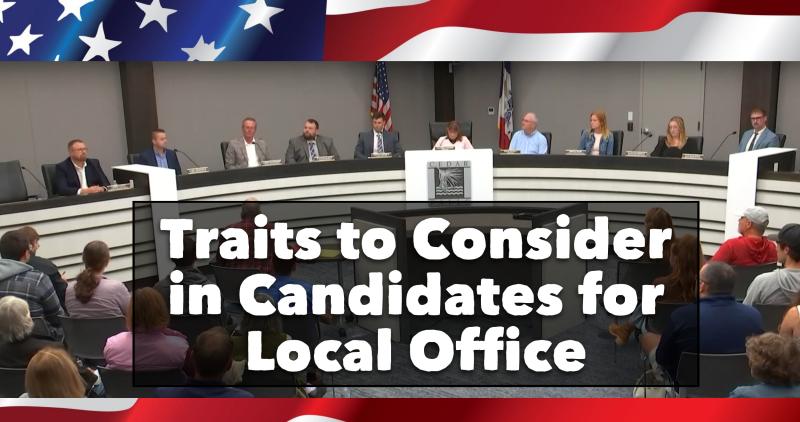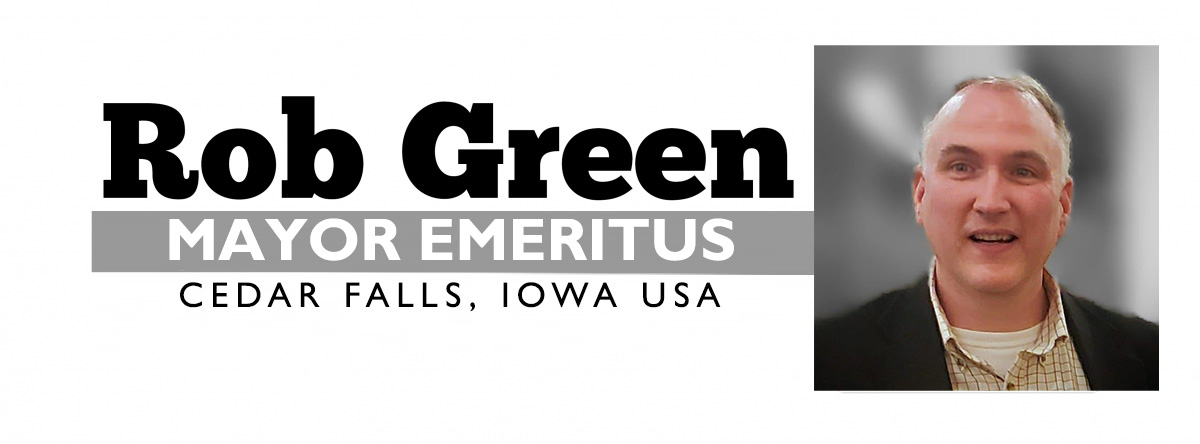
As we approach the November 7th city election in Cedar Falls, it's essential to prepare for an informed vote. With various sources of information at our disposal, voters need to make educated decisions when choosing the next mayor and council members. I’m not endorsing any specific candidates, because, I'm committed to assisting whomever the community elects, offering insights and support during their term. That said, I have a few observations for you to consider, regarding the four roles of any elected official: Delegate, Trustee, Politico, and Partisan. Hopefully, this will help you as you weigh your options on next Tuesday’s ballot.
Role 1: Delegate
Elected officials are expected to advance the interests of the community, and this typically means doing what a majority of citizens want. Since the public isn’t being polled on every topic, the electeds need to circulate and be actively engaged in the community to get a sense of the public’s desires. To me, this means candidates should have a track record of community involvement (outside of politics). Consider whether you've seen them actively participating in civic events and community activities before they decided to run for office. Are they communicative and accessible? Do they actively solicit opinions? Are they approachable or closed off? These are important traits for a delegate, Still, striking a balance is crucial, as excessive populism can be detrimental. Throughout American history, we've witnessed opportunists and demagogues who gained power by exploiting public fear and animosity. This not only reveals a lack of core principles but also poses the risk of descending into mob rule, an extreme form of populism. Washington warned of it in his Farewell Address, and it’s no less true today.
Role 2: Trustee
In the trustee role, the public places its trust in elected officials to handle information that the public either lacks access to or doesn't have the time to research thoroughly. When evaluating candidates for this role, there are three key aspects to consider: character, intelligence, and experience.
Character: It's prudent to assess a candidate's character first, as it largely guides their actions. Questions to ponder include whether they treat others with dignity and respect, their integrity, and how forthright they are about potential conflicts of interest. Do they take responsibility for their mistakes and missteps? Interactions with those who disagree with them or those who can do nothing for them are essential indicators of character. Boorish behavior, threats, and incivility would quickly lose my vote, because a candidate's character is of paramount importance.
Education & Intelligence: Candidates' educational backgrounds and accomplishments play a significant role in shaping their worldviews. A diverse educational background can provide a strong foundation for understanding complex city issues like Tax Increment Financing and the Capital Improvements Program. While intelligence isn't solely determined by a diploma, formal education can be a useful indicator. Knowing a candidate's educational history, what they studied, and their grades can shed light on their ability to absorb and comprehend intricate topics quickly.
Intelligence goes beyond intellectual capabilities; emotional intelligence (EQ) is equally important. EQ encompasses self-management, self-awareness, social awareness, and relationship management. Candidates who demonstrate anger, struggle to connect with their audience, or resist change may lack emotional intelligence. While it's not necessarily a dealbreaker, it's a weakness that requires consideration and potential improvement over time.
Experience: Lastly, evaluate a candidate's past experience in similar roles. The Council Chambers and Mayor's Office are not suitable places for newcomers. Experience on city boards or in other effective group environments, where candidates are accustomed to compromising and collaborating to achieve optimal outcomes, is valuable. For a mayoral candidate, their executive background and leadership skills are vital considerations. The role of the mayor often requires them to be dressed professionally and interact with serious individuals in formal settings regularly. Are they comfortable in such an environment?
Role 3: Politico
A politico is someone with a keen interest in politics. Every elected official is, to some degree, a politico. Elected officials tend to have strong opinions on political matters, which is often why they choose to run for office. Those who claim, "I'm not a politician," are deluding themselves because anyone engaged in the art of politics, by definition, is a politician. The real question is how adept they are at this craft. Can they effectively network, influence, and communicate a compelling vision? Can they engage in fruitful debates and negotiations to achieve the most favorable outcomes? These are the essence of being a successful politico, and have held true since ancient times. It takes study and effort, and is a vital investment for the sake of the community.
Conversely, an ineffective elected official simply votes "no" to a measure without making an effort to persuade the rest of the assembly with logic and reason. The whole assembly should work In a spirit of collaboration and compromise to garner as many votes as possible for a proposal. Such a spirit requires the assembly’s trust in dissenting members to vote on behalf of the measure once compromises have been negotiated. Without that resulting “aye” vote, the majority is less likely to seek compromise the next time, and may settle for a thin majority to pass a measure. Compromise and negotiating in good faith are key to success in politics.
In conclusion, look for candidates with a history of collaboration and the ability to deliberate logically and persuasively. These attributes are the hallmarks of a successful politico.
Role 4: Partisan
Thankfully, local politics in Cedar Falls has traditionally been free from political partisanship, and I sincerely hope it stays that way. While most elected officials do belong to a political party, the issues facing cities do not align neatly with one party or the other. As the saying goes, "Potholes don't care if you're a Republican or a Democrat." It's a concern if candidates heavily target potential voters from a specific political party, as this introduces unnecessary division into the local civic conversation right from the start. Similarly, I'm cautious of local elected officials who endorse politicians at the state or federal level, because it colors local politics with unnecessary and unproductive partisanship. When people have asked about my own political party status, I tell them I’m in the “Cedar Falls Party” -- I’m willing to work with anyone who’s interested in the betterment of Cedar Falls, regardless of their political party affiliation. I’ll be looking to vote for candidates with that same mindset.
Final Thoughts
Voting for a person to represent you in the halls of government is no easy task; it’s very unlikely to find a candidate who shares your opinion on 100% of the issues. The reality is, lots of issues will appear out of nowhere during an elected official’s term (think COVID) and so it’s much more important to vote for people of strong character and integrity, a solid background of service to others, high emotional intelligence, and an appreciation for the realities of politics (i.e. how to get things done). To me, that’s way more important than their position on the issue of the day, and this approach should result in elected leaders of high caliber representing us in government.
If this article resonates with you, I highly recommend reading Richard Haass’s excellent book, “The Bill of Obligations: Ten Habits of Good Citizens”, which goes much more into detail about what we should expect from those who represent us in the halls of power. With some thought and care, we can ensure we have the government we want at all levels -- starting right here at 220 Clay Street.
As always, thank you for reading to the end, and for doing the hard work to be an informed and engaged citizen!
